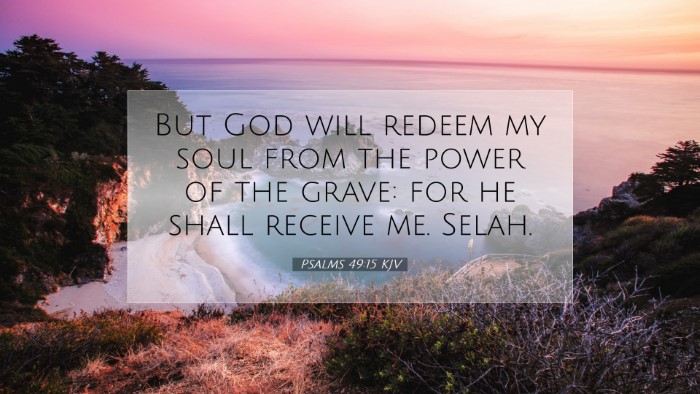Commentary on Psalm 49:15
Bible Verse: "But God will redeem my soul from the power of the grave: for he shall receive me. Selah." (Psalm 49:15)
Introduction
This verse, nestled in the context of Psalm 49, serves as a profound declaration of faith amidst the psalmist's contemplation of mortality, wealth, and the transitory nature of human life. It highlights God's ultimate authority over life and death and the promise of redemption. The insights derived from the public domain commentaries of Matthew Henry, Albert Barnes, and Adam Clarke provide a rich tapestry of understanding this significant verse.
The Context of Psalm 49
Psalm 49 addresses the folly of trusting in riches and the inevitability of death. The psalm opens with a call to the world, emphasizing the need for wisdom and understanding. The psalmist reflects on the fate of those who place their hope in material wealth, asserting that such riches offer no protection against the grave. In verse 15, he offers a stark contrast to the despair of those without hope, proclaiming God's redemptive power.
Hebrew Word Study
- Redeem: The Hebrew word translated as "redeem" (_ga'al_) implies a sense of rescue or deliverance, often used in the context of freeing someone from bondage or danger.
- Power of the grave: The term for "grave" (_sheol_) denotes the realm of the dead, highlighting the ultimate fate awaiting all humanity.
- Receive: This word conveys not only acceptance but also implies an invitation into fellowship, underscoring God's desire to be with His redeemed.
Analysis of Psalm 49:15
The assertion, "But God will redeem my soul from the power of the grave," stands as a declaration of hope. Matthew Henry observes that this verse transitions from the despair of human destiny to divine assurance. It reveals the psalmist's unwavering belief that, despite the natural course of life leading to death, God possesses the authority to redeem and resurrect.
Matthew Henry's Insights
Henry emphasizes that the psalmist's confidence is rooted not in personal merit but in God's character and fidelity. He suggests that while wealth may provide temporary comfort, it cannot alter the finality of death. Henry notes, "God will not only redeem my soul but will do so by His strength, conquering death itself." This insight reminds believers that their hope lies not in worldly assets but in God's faithfulness to His promises.
Albert Barnes' Commentary
In his commentary, Barnes draws attention to the promise of redemption, characterizing it as a divine action that offers assurance to the believer. He states, "God's power extends beyond the grave; He has the ability to restore and renew." Barnes delves into the theological implications of resurrection, correlating the psalmist's hope with New Testament revelations of Christ's victory over death. This perspective is crucial for understanding the continuity of God's redemptive plan throughout scripture.
Adam Clarke's Perspective
Clarke adds depth by interpreting the phrase "he shall receive me" as an invitation into communion with God. He posits that this reception signifies not merely avoidance of the grave but a transformative relationship with the Divine. Clarke writes, "The soul's rescue from the grave is God's pledge to receive believers into His eternal presence." This interpretation encourages readers to see redemption as a holistic experience involving both salvation from death and a promise of eternal life with God.
Theological Implications
Psalm 49:15 encapsulates essential theological themes relevant to pastors and scholars:
- Redemption: The verse reinforces the doctrine of redemption, reminding believers of God's agency in offering salvation.
- Eschatology: It sets a foundation for eschatological hope, emphasizing resurrection and the afterlife as central to the Christian faith.
- The Nature of God: The verse reveals God's compassion and desire to rescue, contrasting human helplessness with divine omnipotence.
Practical Application
Pastors and teachers can draw on this scripture to encourage congregations facing despair. The assurance of redemption should be infused in sermons, offering hope to those grappling with the reality of mortality or loss. For theology students, this verse provides a rich case study in exploring God's nature, human frailty, and the assurance of salvation.
Encouragement for Believers
Ultimately, Psalm 49:15 serves as a beacon for both the suffering and the indifferent. It calls individuals to shift their trust away from earthly riches and place it firmly in God's promises. The psalmist's faith journey invites believers to rest in the assurance of God's redemptive love, fostering a community centered around hope and fellowship.
Conclusion
Psalm 49:15 stands as a testament to the enduring nature of God's promises amidst life's uncertainties. By synthesizing the insights from Matthew Henry, Albert Barnes, and Adam Clarke, we uncover a multi-faceted understanding of redemption that speaks to the heart of the Gospel. This verse challenges believers to reflect on their trust in God and His ability to redeem, urging them to embrace the hope that transcends the grave.


